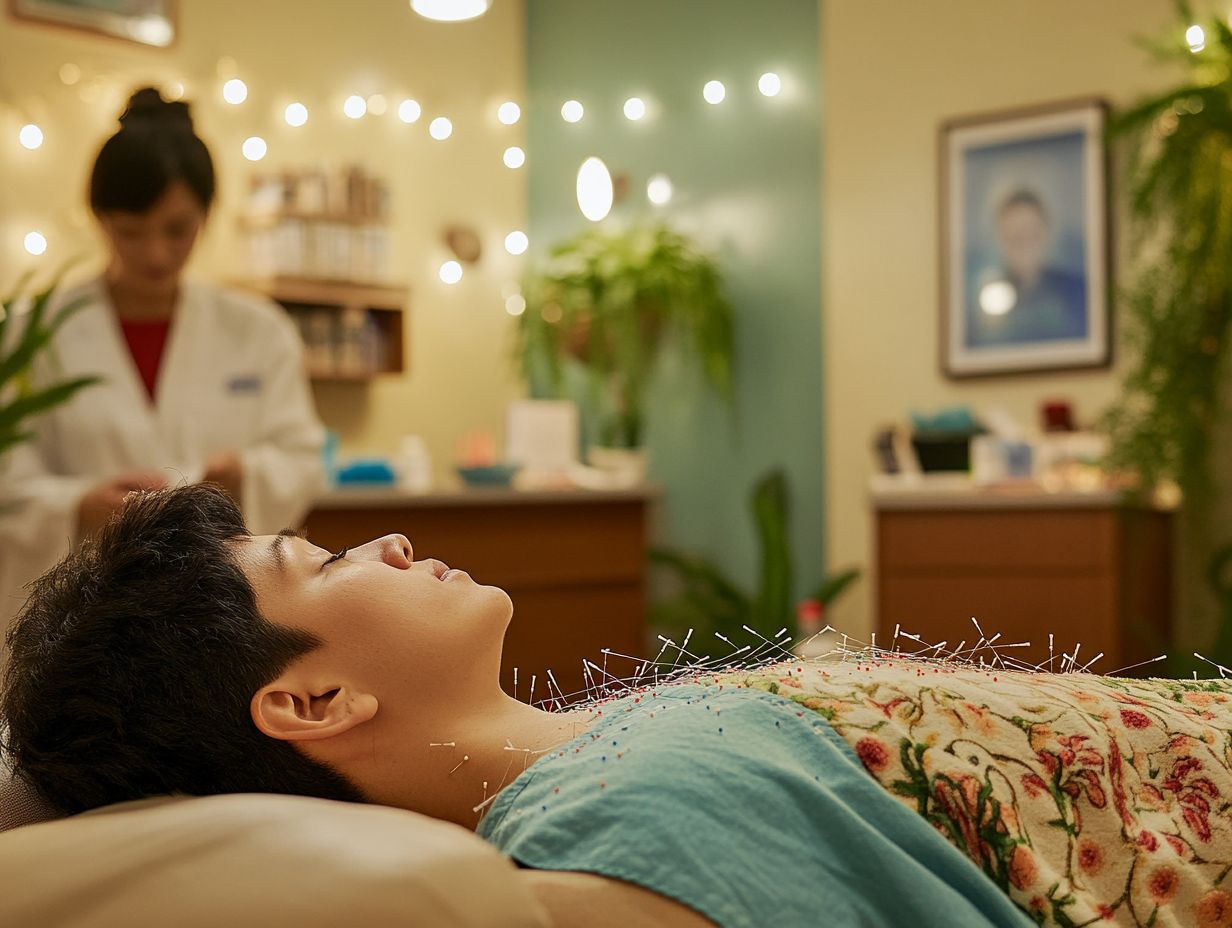How Acupuncture Affects the Nervous System
Acupuncture is not just an ancient practice; it uniquely blends tradition with modern science, especially in how it affects your nervous system. This article explores how acupuncture can help reduce stress, relieve anxiety, and manage pain effectively.
You ll also discover the potential side effects and risks, empowering you with the knowledge needed before trying your first session. Join us as we uncover the essentials of acupuncture, setting the stage for a truly transformative experience.
Contents
- Key Takeaways:
- The Science Behind Acupuncture
- How Acupuncture Stimulates the Nervous System
- Benefits of Acupuncture for the Nervous System
- Reducing Stress and Anxiety
- Pain Management
- Side Effects and Risks of Acupuncture
- Preparing for an Acupuncture Session
- Frequently Asked Questions
- How does acupuncture affect the nervous system?
- What are the benefits of acupuncture on the nervous system?
- Can acupuncture help with nerve pain?
- Are there any risks or side effects of acupuncture on the nervous system?
- How many acupuncture sessions are needed to see results on the nervous system?
- Can acupuncture help with neurological conditions?
Key Takeaways:

Acupuncture stimulates the nervous system by activating the body’s natural painkillers and promoting blood flow, which helps reduce stress and anxiety.
Research shows that acupuncture can effectively manage pain for conditions like migraines, back pain, and arthritis.
It’s crucial to find a qualified practitioner and communicate any health conditions or medications before an acupuncture session to minimize potential risks and side effects.
What is Acupuncture?
Acupuncture is a profound practice rooted in traditional Chinese medicine that involves inserting thin needles at specific points on your body. This age-old technique facilitates healing, boosts emotional well-being, and addresses various physical ailments.
The goal is to restore balance and promote homeostasis by influencing your body’s energy flow, known as Qi (the body’s energy). It can be particularly effective in managing chronic stress and its related symptoms.
Dating back over 2,500 years, acupuncture has become a foundational element of holistic health in Chinese medicine, alleviating pain and enhancing mental clarity while regulating emotions.
This technique offers a range of approaches, including:
- Manual acupuncture
- Electro-acupuncture
- Auricular therapy
All approaches are tailored to meet your unique needs. By targeting specific meridians, practitioners create pathways for energy flow, relieving tension and restoring emotional stability.
As research continues to affirm its effectiveness, acupuncture gains worldwide recognition, becoming an essential part of comprehensive healing practices that aim to deliver both physical and emotional wellness.
Overview of the Nervous System
The nervous system is a remarkably intricate network that plays a crucial role in coordinating your bodily functions and responses. It includes both the central and peripheral systems, encompassing the sympathetic and parasympathetic nervous systems, each essential for autonomic regulation.
This system not only manages physical reactions; it also significantly influences your emotional states and responses to stress, tirelessly working to maintain homeostasis.
The sympathetic nervous system prepares your body for ‘fight or flight’ situations, accelerating your heart rate and redirecting blood flow to your muscles, ensuring you’re equipped to tackle perceived threats.
Conversely, the parasympathetic nervous system encourages ‘rest and digest’ activities, slowing your heart rate and promoting recovery. The balance between these two systems is vital for effective stress management.
Ultimately, this intricate interplay allows you to maintain optimal health by regulating both your physiological processes and emotional well-being.
The Science Behind Acupuncture
The science behind acupuncture invites you to explore its intriguing effects on neurotransmitter regulation and endorphin release. Clinical studies showcase its efficacy in addressing a range of conditions, from stress-related disorders to chronic pain.
By stimulating specific points on the body, acupuncture skillfully modulates your neurochemical pathways, helping you feel better physically and emotionally.
How Acupuncture Stimulates the Nervous System
Acupuncture is an amazing method that stimulates your nervous system through specific points. This helps manage both the sympathetic and parasympathetic nervous systems.
As a result, you may feel more balanced, with emotional well-being flourishing and physical stress symptoms fading. By targeting nerve pathways, acupuncture calms your sympathetic nervous system, which can be overactive during stress.
You might notice a drop in your heart rate and blood pressure. This paves the way for a tranquil mind.
The parasympathetic nervous system encourages your body to restore itself, improving digestion and sleep quality.
These changes not only offer immediate relaxation but also promote long-term emotional stability. Acupuncture is a powerful ally in managing stress and enhancing your mental health.
Benefits of Acupuncture for the Nervous System

Acupuncture offers many benefits for the nervous system, enhancing emotional well-being and managing physical symptoms tied to chronic stress.
It helps restore balance and boosts your body s natural healing processes, making it a valuable therapeutic approach.
Reducing Stress and Anxiety
Acupuncture is known for easing stress and anxiety. It fosters emotional well-being through relaxation techniques.
By influencing your body’s stress response and promoting endorphin release, acupuncture effectively alleviates anxiety symptoms. This ancient practice targets specific points on your body to restore balance and energy flow, known as ‘qi.’
The fine needle insertion starts a series of reactions that lower cortisol levels and bring about tranquility.
When you combine acupuncture with relaxation techniques like deep breathing or mindfulness, its effects multiply. Many people notice lower anxiety levels and greater clarity, promoting a holistic approach to stress management.
Pain Management
Acupuncture is a powerful tool for managing pain, especially chronic pain and its symptoms. It activates your immune functions and promotes healing by stimulating points that regulate pain pathways.
This practice encourages the release of endorphins and neurochemicals crucial for reducing pain. Clinical studies show that acupuncture can ease conditions like arthritis, fibromyalgia, and migraines.
Acupuncture also enhances blood circulation, delivering nutrients and speeding up recovery from injuries. This technique not only addresses physical pain but also considers emotional well-being, fostering overall balance.
Side Effects and Risks of Acupuncture
Acupuncture is generally safe, but it’s important to know potential side effects and risks. This is especially true for certain populations or those undergoing trauma treatment.
Understanding these factors can enhance your acupuncture experience, ensuring it remains safe and effective.
Common Side Effects
Common side effects of acupuncture can cause minor physical symptoms such as soreness or bruising at the needle insertion sites. Thankfully, these sensations are typically short-lived and resolve fairly quickly.
Clinical studies show that these side effects are generally mild when weighed against the healing benefits of acupuncture. In fact, a review published in the journal Pain Medicine revealed that less than 10% of patients report any adverse effects, with most describing their experiences as soothing and helpful.
Other reported side effects might include lightheadedness and mild nausea; however, these symptoms are often fleeting, diminishing shortly after your treatment.
Research indicates that the overall incidence of serious adverse events is extremely low, reinforcing the safety of acupuncture as a complementary therapy. So, while you may encounter some discomfort, the evidence suggests these concerns are minimal compared to the potential health gains you can achieve.
Risks for Certain Populations

Certain populations may encounter heightened risks when considering acupuncture. This is especially true for individuals with specific health concerns or those receiving trauma treatment.
It s important to have a thorough assessment before starting. Recognizing these risks is vital for maintaining your emotional well-being and ensuring your safety.
If you have underlying conditions such as diabetes, heart disease, or a compromised immune system, you’ll need special attention from practitioners. Additionally, pregnant women and the elderly may face unique challenges that require tailored approaches.
It s crucial for practitioners to conduct thorough health checks and communicate effectively about potential side effects, boosting your comfort and understanding throughout the process.
Practitioners can minimize risks by adjusting needle techniques and closely monitoring patients during sessions. This allows them to maximize the healing benefits. This approach fosters a safer environment, particularly for those who may be more vulnerable.
Preparing for an Acupuncture Session
Preparing for your acupuncture session is all about setting the right expectations and selecting a qualified practitioner who can guarantee a safe and effective experience. Don t miss out on the chance to feel your best!
This preparation will boost your treatment experience, allowing you to embrace relaxation techniques that amplify the benefits of acupuncture.
What to Expect and How to Find a Qualified Practitioner
When you seek acupuncture, it s essential to understand what to expect during your session and how to find a qualified practitioner who can effectively address your stress response while promoting emotional well-being. Taking these steps can significantly enhance your overall experience and therapeutic outcomes.
During an acupuncture session, you ll typically find yourself in a calming environment designed to foster relaxation, complete with dim lighting and soothing music. The practitioner will usually start by discussing your concerns and assessing your specific needs before gently inserting fine, sterile needles into targeted areas of your body to stimulate energy flow, helping to balance your body s energy, often referred to as Qi (pronounced chee ).
After the treatment, you will likely feel a wave of tranquility wash over you, along with reduced anxiety and even a boost in clarity of thought.
To ensure a quality experience, it s important to seek out licensed practitioners with positive reviews and consider those who specialize in holistic health practices. They are more likely to grasp both the physical and emotional dynamics at play, ensuring you receive the most comprehensive care.
Frequently Asked Questions
How does acupuncture affect the nervous system?
Acupuncture has been shown to stimulate the release of endorphins, which are natural pain-relieving chemicals in the brain. This can help to decrease pain and promote relaxation in the nervous system.
What are the benefits of acupuncture on the nervous system?

Acupuncture can help to improve nerve function and communication, reduce inflammation, and improve blood flow, all of which can have positive effects on the nervous system. It can also help to alleviate symptoms of anxiety, depression, and other mental health disorders.
Can acupuncture help with nerve pain?
Yes! Acupuncture can effectively relieve nerve pain. It stimulates the nervous system, reducing pain signals and boosting the release of natural painkillers in the body.
Are there any risks or side effects of acupuncture on the nervous system?
Acupuncture is generally safe when performed by a trained and licensed practitioner. Some individuals may experience minor side effects like bruising or soreness at the needle site.
How many acupuncture sessions are needed to see results on the nervous system?
The number of sessions varies based on your condition and how you respond to treatment. Some feel relief after just one session, while others may need several over time.
Your acupuncturist will help create a personalized treatment plan for you.
Can acupuncture help with neurological conditions?
Acupuncture doesn’t cure neurological conditions, but it can help manage symptoms and improve quality of life. Those with conditions like multiple sclerosis, Parkinson’s disease, or neuropathy should consult a healthcare provider and a licensed acupuncturist to see if it’s right for them.






